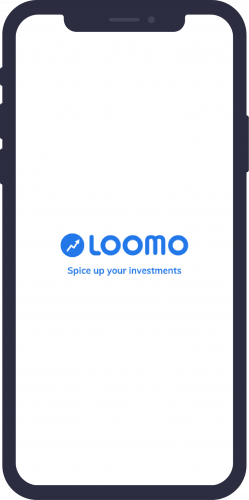Download Loomo Today
Your financial independence journey starts here
Loomo simplifies saving and investing


LOOMO Disclosures
LOOMO.africa and LOOMO.finance are properties of LOOMO Inc, a company duly registered in Delaware, USA. LOOMO.africa and LOOMO.finance are operated by LOOMO Systems Nigeria Limited. to provide marketing, customer service, operations, and technology services to brokers on behalf of their customers. LOOMO Systems Nigeria is a legal entity in Nigeria, duly registered with the Corporate Affairs Commission, Nigeria.
LOOMO refers to LOOMO Systems Nigeria Limited and LOOMO Inc.
LOOMO is a technology platform and not a registered broker-dealer nor an investment adviser and has therefore partnered with Trove Technologies Limited to provide the necessary regulatory cover.
US-traded securities, including fractional trading, are provided to LOOMO users via Trove Technologies by DriveWealth LLC. DriveWealth LLC is a member FINRA. DriveWealth LLC is also a member of Securities Investor Protection Corporation (SIPC), which protects securities customers of its members up to $500,000 (including $250,000 for claims for cash). Explanatory brochure available upon request or at www.sipc.org.
LOOMO Systems Nigeria is a wholly-owned subsidiary of LOOMO, Inc. Trove Technologies and DriveWealth LLC are unaffiliated with LOOMO Systems Nigeria and LOOMO, Inc.
The content on this website is for informational purposes only. LOOMO does not recommend any specific securities. Investing involves risk, including loss of principal. Please consider, among other important factors, your investment objectives, risk tolerance and LOOMO’s pricing before investing. Individual investors should make their own decisions or seek independent advice.
LOOMO does not provide access to invest directly in Bitcoin and other cryptocurrencies. Cryptocurrency exposure is provided through investment in stocks and ETFs.
Cryptocurrencies in general are speculative and volatile in nature. Investors seeking direct exposure to the price of bitcoin and other cryptocurrencies should consider a different investment.
LOOMO.africa and LOOMO.finance are properties of LOOMO Inc, a company duly registered in Delaware, USA. LOOMO.africa and LOOMO.finance are operated by LOOMO Systems Nigeria Limited. to provide marketing, customer service, operations, and technology services to brokers on behalf of their customers. LOOMO Systems Nigeria is a legal entity in Nigeria, duly registered with the Corporate Affairs Commission, Nigeria.
LOOMO refers to LOOMO Systems Nigeria Limited and LOOMO Inc.
LOOMO is a technology platform and not a registered broker-dealer nor an investment adviser and has therefore partnered with Trove Technologies Limited to provide the necessary regulatory cover.
US-traded securities, including fractional trading, are provided to LOOMO users via Trove Technologies by DriveWealth LLC. DriveWealth LLC is a member FINRA. DriveWealth LLC is also a member of Securities Investor Protection Corporation (SIPC), which protects securities customers of its members up to $500,000 (including $250,000 for claims for cash). Explanatory brochure available upon request or at www.sipc.org.
LOOMO Systems Nigeria is a wholly-owned subsidiary of LOOMO, Inc. Trove Technologies and DriveWealth LLC are unaffiliated with LOOMO Systems Nigeria and LOOMO, Inc.
The content on this website is for informational purposes only. LOOMO does not recommend any specific securities. Investing involves risk, including loss of principal. Please consider, among other important factors, your investment objectives, risk tolerance and LOOMO’s pricing before investing. Individual investors should make their own decisions or seek independent advice.
LOOMO does not provide access to invest directly in Bitcoin and other cryptocurrencies. Cryptocurrency exposure is provided through investment in stocks and ETFs.
Cryptocurrencies in general are speculative and volatile in nature. Investors seeking direct exposure to the price of bitcoin and other cryptocurrencies should consider a different investment.
© 2024 LOOMO Systems Nigeria Limited. All rights reserved.
© 2024 LOOMO Inc. All rights reserved.
